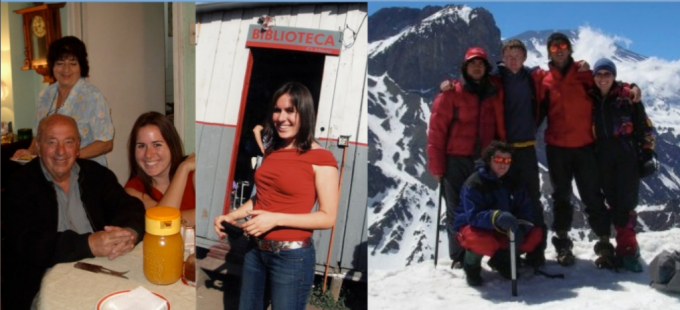Moving Home After Living Abroad: 4 Tips for Re-Entry
This is not my first experience with re-entry. I’ve experienced two severe bouts of reverse culture shock over the years, along with many milder ones. Here’s what I’ve learned along the way.

I recently moved back to my hometown, San Francisco, after spending the past three years in Chile, where I taught entrepreneurship courses at universities and collaborated with local startups.
This is not my first experience with re-entry. I’ve experienced two severe bouts of reverse culture shock over the years, along with many milder ones. Here’s what I’ve learned along the way.
After Chile, Back to School

These pictures are from my year abroad. LEFT: with my host mother, Latife, and her husband Jaime. MIDDLE: standing in front of the library in the Toma de Peñalolen, where I volunteered. RIGHT: with montañismo classmates at the top of a snowy mountain we climbed.
At the end of 2005, I finished my year studying abroad in Chile. As I packed my suitcases, I tried to summarize my experience in one sentence: Chile’s a country of contrast between rich and poor, traditional and modern, liberal and conservative, city and country side and as an international student, I was able to see the extremes of all of these different contrasts often in the same day. In December I left Chilean summer and landed in California winter.
Chile changed my perspective. I’d grown up. I was 21.
It hit me hardest when I went back to college. I lived in the sorority house where I’d lived B.C. (before Chile). The rules seemed silly — no boys upstairs after ten or downstairs past midnight, you must wear light-but-bright-blue + bronze + brown tweed for tomorrow’s event….
I overcommitted myself. I needed two classes to graduate, but signed up for five, including a social entrepreneurship seminar, a student-taught women’s leadership course and ballet, plus too many activities and internships.
About a month into the semester, it hit me hard. Rushing everywhere, fueled by fear of missing out, exhausted — I missed Chile.
A few months later, I graduated with a degree in Latin American Studies. Then I moved to China. (Here’s the full story.)
After China, Hometown Adventure
In December 2007, after a year and a half in China, I moved back to San Francisco.
As I packed my bags, I tried to summarize my experience into one sentence and came up with one word.
Harmonious. A word I’d heard many times in China. “Build a Harmonious Society” is a Chinese government slogan that refers to hierarchy, stability, peace and respect. This was the topic for a student speech competition I’d judged and a favorite buzzword for Corporate Social Responsibility initiatives. But when I arrived home, I realized that this convoluted story about “harmonious” was not what anybody wanted to hear.
When people asked me about China, I said: “Fun, interesting. Lots of people.” And then we’d move on to another topic.
I’d say things like, “Wow, there’s free coffee at Bank of America! You can understand exactly what I need and help me in five minutes!?!?” and “Wow, Trader Joe’s has so many choices. And I can read all the labels!”
Fast Forward to Now
 Now I’m back in San Francisco again, adjusting. I’m staying in my parents’ house (they’re out of town) and I’ve had plenty of time and space to myself over the past month. I’ve figured out how to introduce myself without going on and on about my travels. I can’t say it’s been totally flawless: 6am fire alarm I don’t know how to turn off? Not fun. Long-distance relationship? Not easy. But I have learned a lot over the years about how to process all these faraway experiences and move forward here.
Now I’m back in San Francisco again, adjusting. I’m staying in my parents’ house (they’re out of town) and I’ve had plenty of time and space to myself over the past month. I’ve figured out how to introduce myself without going on and on about my travels. I can’t say it’s been totally flawless: 6am fire alarm I don’t know how to turn off? Not fun. Long-distance relationship? Not easy. But I have learned a lot over the years about how to process all these faraway experiences and move forward here.
4 Tips for Going Home After Living, Working, or Studying Abroad
(1) Give yourself time to adjust.
There are lots of subtle, mental shifts that you don’t necessarily recognize until you’ve lived them, but if you’re in the supermarket saying, “OMG I can read all the labels!” you should give yourself that moment to pause and think about it rather than jumping right ahead to, “I have five minutes to buy all these things on this list.”
(2) Keep your descriptions concise.
Your family and friends probably don’t want to hear all the details. An analogy: one of my best friends earned her PhD in biophysics. If she were to talk for an hour about her experiments, I probably wouldn’t understand it all. She and I are better off talking about things we have in common: friends from high school, what her sister’s up to, a bit about what we’ve been doing since we last met. But it can’t be a monologue. If it is a monologue, it is not really a conversation.
(3) Don’t go back to the same living arrangements as before.
It’s important to re-negotiate the major relationships in your life, as well as where you’re living and how you’re spending your days. You’ve changed. It’s important to figure out ways to acknowledge and account for these changes. It’s easier said than done, and it takes time.
(4) Get professional help.
Working with a résumé editor, or a career coach that can help you translate your experience into clear value in the local labor market, or a professional who’s familiar with re-entry issues can be helpful. Cate Brubaker has excellent resources about Re-Entry Reality on her website, Small Planet Studio.
What else might you add to this list?
Update: November 25, 2014
Added by Stacie Berdan, via Facebook: “I’d add one more tip: Learn to tell a great story. This way, when you’re asked about your international adventures, you can share it in an engaging and non-threatening way. This one is particularly helpful with employers.”
I agree. It’s so important to be able to tell a great story that resonates with whomever you’re talking in a specific situation. Since I’ve been back I’ve frequently told the story of how I chose General Assembly‘s User Experience Design Immersive. In Chile I taught entrepreneurship classes with a focus on design methodology, and I wanted to go deeper into how design methods can be used to improve user experiences. It’s a more technical, specialized and applied approach to topics I’d explored a bit before.
It’s really important to be able to connect the dots in a way that’s engaging, non-threatening, and easy to understand.
Now that we’ve finished the course, I’m applying for jobs. This means that I’m continually re-telling my story, choosing details that are specifically relevant to each potential employer. In some cases this has meant emphasizing my language skills, in others it’s about showcasing my experience with mining-related startups, technical storytelling, this blog, or something completely different. I’m lucky to have such a wide variety of anecdotes to draw from!
This post originally appeared on Lane Letters, my friend and former colleague Christy’s lovely blog about living adventurously in the middle.